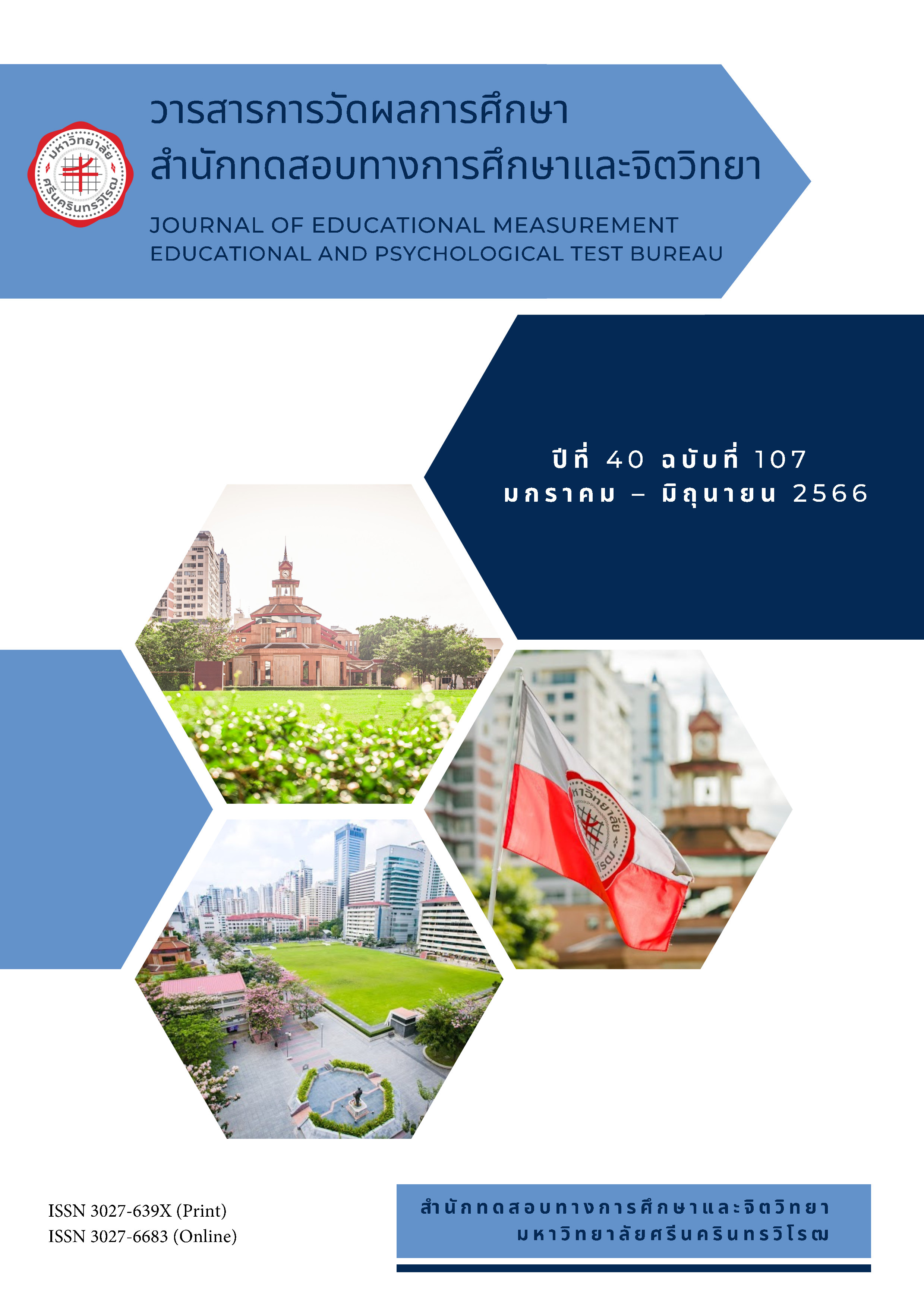การเปรียบเทียบการวิเคราะห์องค์ประกอบเชิงยืนยันของโมเดลการวัดความเป็นพลเมืองดิจิทัล ของนักเรียนระหว่างการประมาณค่าความน่าจะเป็นสูงสุดและการวิเคราะห์แบบเบส์
คำสำคัญ:
ความเป็นพลเมืองดิจิทัล, การวิเคราะห์องค์ประกอบเชิงยืนยัน, วิธีการประมาณค่าความน่าจะเป็นสูงสุด, การวิเคราะห์แบบเบส์บทคัดย่อ
บทความนี้นำเสนอการวิเคราะห์องค์ประกอบเชิงยืนยันของโมเดลการวัดความเป็นพลเมืองดิจิทัล 2 วิธีในเชิงเปรียบเทียบ ได้แก่ วิธีที่ใช้กันอย่างแพร่หลายในการวิจัยคือ วิธีการประมาณค่าความน่าจะเป็นสูงสุดที่มีรากฐานมาจากแนวคิดของสถิติแบบความถี่ และวิธีการวิเคราะห์แบบเบส์ กลุ่มตัวอย่าง ได้แก่ นักเรียนระดับชั้นมัธยมศึกษาตอนปลายในโรงเรียนสังกัดสำนักงานคณะกรรมการการศึกษาขั้นพื้นฐาน (สพฐ.) เขตกรุงเทพมหานคร จำนวน 450 คน ได้มาจากการสุ่มตัวอย่างแบบสองขั้นตอน เครื่องมือที่ใช้ในการวิจัยเป็นแบบวัดความเป็นพลเมืองดิจิทัล จำนวน 46 ข้อ วิเคราะห์ข้อมูลด้วยการวิเคราะห์องค์ประกอบเชิงยืนยันด้วยการประมาณค่าความน่าจะเป็นสูงสุดและการวิเคราะห์แบบเบส์ ผลการวิจัยพบว่า 1) การเปรียบเทียบโมเดลที่วิเคราะห์แบบเบส์ 3 โมเดล พบว่า โมเดลที่เหมาะสมที่สุดคือ โมเดลที่ให้สารสนเทศการแจกแจงความน่าจะเป็นก่อนหน้าของ cross-loadings และ residual correlations และ 2) การวิเคราะห์องค์ประกอบเชิงยืนยันของโมเดลการวัดความเป็นพลเมืองดิจิทัลของนักเรียนด้วยวิธีการประมาณค่าความน่าจะเป็นสูงสุดและการวิเคราะห์แบบเบส์ ให้ผลการวิเคราะห์ที่แตกต่างกัน
เอกสารอ้างอิง
ไชยันต์ สกุลศรีประเสริฐ. (2556). การวิเคราะห์องค์ประกอบเชิงยืนยัน. วารสารจิตวิทยาคลินิก, 44(1), 1-16.
ปรเมศวร์ พืชผักหวาน และคณะ. (2564). การวิเคราะห์องค์ประกอบเชิงยืนยันสมรรถนะความเป็นพลเมืองดี สำหรับนักศึกษาปริญญาตรี สถาบันบัณฑิตพัฒนศิลป์. วารสารการวัดผลการศึกษา, 38(103), 237-247.
พิมพ์ลักษณ์ เจริญวานิชกูร. (2564). ความเหมาะสมของโมเดลการวัดความเป็นพลเมืองดิจิทัลของนักเรียนแบบสะท้อนและแบบก่อตัว: การวิเคราะห์ด้วยสถิติแบบเบส์. [วิทยานิพนธ์ปริญญามหาบัณฑิต, จุฬาลงกรณ์มหาวิทยาลัย]. Chulalongkorn University Intellectual Repository (CUIR). http://cuir.car.chula.ac.th/handle/123456789/79689
ภัทราวดี มากมี. (2563). การพัฒนาโมเดลองค์ประกอบเชิงยืนยันพหุระดับทักษะการเรียนรู้และนวัตกรรมสำหรับนักเรียนระดับมัธยมศึกษาตอนปลาย. วารสารการวัดผลการศึกษา, 37(102), 138-147.
Asparouhov, T., Muthén, B., & Morin, A. (2015). Bayesian Structural Equation Modeling With Cross-Loadings and Residual Covariances: Comments on Stromeyer et al. Journal of Management, 41(6), 1561-1577.
De Beer, L. T., & Bianchi, R. (2019). Confirmatory factor analysis of the Maslach Burnout Inventory: A Bayesian structural equation modeling approach. European Journal of Psychological Assessment, 35(2), 217–224.
International Society for Technology in Education (ISTE). (2017). International Society for Technology in Education Standards for Students. https://www.iste.org/standards/for-students.
Dombrowski, S. C., Golay, P., McGill, R. J., & Canivez, G. L. (2018). Investigating the theoretical structure of the DAS-II core battery at school age using Bayesian structural equation modeling. Psychol Schools, 55, 190-207.
Muthén, B., & Asparouhov, T. (2012). Structural equation modeling: a more flexible representation of substantive theory. Psychological Methods, 17(3), 313-335.
Nozaki, Y., Puente-Martínez, A., & Moïra Mikolajczak. (2019). Evaluating the higher-order structure of the Profile of Emotional Competence (PEC): Confirmatory factor analysis and Bayesian structural equation modeling. PLoS ONE, 14(11).
Önen, E. (2019). A comparison of frequentist and bayesian approaches: The power to detect model misspecifications in confirmatory factor analytic models. Universal Journal of Educational Research, 7(2), 494-514.
Ribble, M. (2017). Digital Citizenship: using technology appropriately. https://www.digitalcitizenship.net/nine-elements.html.
Taylor, J. M. (2019). Overview and Illustration of Bayesian Confirmatory Factor Analysis with Ordinal Indicators. Practical Assessment, Research, and Evaluation, 24(4), 1-27.
UNESCO. (2017). Digital Citizenship Education in Asia-Pacific Outcome Document. Conference on Digital Citizenship Education in Asia-Pacific, 22-24.



